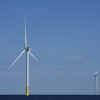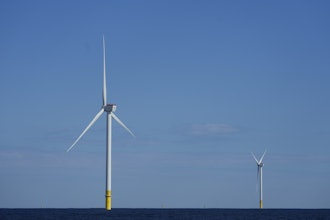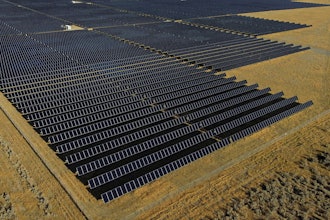WASHINGTON (AP) -- For the time being at least, congressional Democrats appear to be conceding in the standoff with Republicans over more offshore oil drilling as they prepare to let a quarter-century ban on oil and natural gas drilling off the Atlantic and Pacific coasts fall by the wayside.
A provision that would bar drilling in federal waters along the two coasts has been left off a stopgap spending bill that the House was expected to approve Wednesday, sending it to the Senate, where it is likely to be welcomed.
Each year since 1981 Congress has prohibited the Interior Department from spending money on drilling leases in Outer Continental Shelf waters along the Atlantic and Pacific coasts, in effect banning energy companies from even drilling exploratory wells or undertaking seismic studies in sea bottoms believed to contain at least 18 billion barrels of oil.
Coastal states long have worried that such drilling might cause spills, soil beaches and threaten their tourist businesses.
But the drilling ban language was dropped from the spending bill that will be needed to keep the government operating after Congress recesses for the November election. The White House had made clear the president would veto the measure if it included the no-drill language, Rep. David Obey, D-Wis., chairman of the House Appropriations Committee, told reporters.
Drew Hammill, a spokesman for House Speaker Nancy Pelosi, said the White House "made it clear any new drilling provision was a nonstarter" and threatened the broader spending measure. Some Democrats said there were Republican lawmakers ready to shut down the government over the drilling issue.
President Bush lifted an executive ban on offshore drilling in July, but that meant little as long as the congressional moratoria were in place.
Republicans late Tuesday were quick to declare victory on a matter that in recent months grew to be the dominating energy issue not only in Congress, but in the presidential campaign.
This "capitulation by Democrats," said House Republican leader John Boehner of Ohio, "adds momentum to our efforts ... to enact the comprehensive energy plan that the American people support and deserve," including expanded energy production and a sharing of royalties from any offshore drilling with the states.
It is a theme that also has played well in the presidential campaign as GOP nominee John McCain has repeatedly called for more offshore drilling as a way to curtail U.S. reliance on imported oil. "Drill, baby, drill," delegates chanted at the GOP nominating convention.
With opinion polls suggesting a shift in favor of pumping more domestic oil and natural gas, even in areas long off limits, Democratic presidential nominee Barack Obama said he too supported limited expansion of offshore drilling if it came with a broader energy plan that also spurs alternative energy and efficiency.
House Democrats had hoped to include in the spending bill a scaled-back drilling provision that would have opened waters beyond 50 miles offshore if a state agreed. But they abandoned that effort after becoming convinced it not only would have trouble getting 60 votes in the Senate, but also would prompt an almost certain veto by Bush.
"Democrats know we cannot afford to shut down the government over this," said Jim Manley, a spokesman for Senate Majority Leader Harry Reid.
House and Senate Democrats for days have been working closely to try to craft a stopgap spending bill that could pass both chambers. Pelosi and Reid made clear through spokesmen late Tuesday that the issue of offshore drilling would be revisited next year as part of broader energy legislation with a new president and Congress.
"We look forward to working with the next president to hammer out a final resolution of this issue," said Manley, speaking on behalf of Reid.
While the ban on energy development along the Pacific and Atlantic coasts will expire with the conclusion of this fiscal year, Sept. 31, under the House provision, it doesn't mean there will be any federal sale of oil and gas leases in the offshore waters -- much less actual drilling -- any time soon.
The Interior Department's current five-year leasing plan includes potential leases off the Virginia coast but probably would not be pursued unless the state agrees to energy development. And the state is unlikely to do so without Congress agreeing to share federal royalties with the state.
In any case, energy experts say it takes five years to 10 years for any oil to flow after the initial lease offering is made.
Offshore oil and gas development has been concentrated in the western Gulf of Mexico from Alabama to Texas, and the Interior Department has made available leases off Alaska where there has been no ban. Even with the lifting of the federal drilling moratorium, energy companies still would be barred from waters within 125 miles of Florida's west coast. Those waters remain protected under a 2006 law that opened 8.3 million acres to drilling in the east-central Gulf.


















